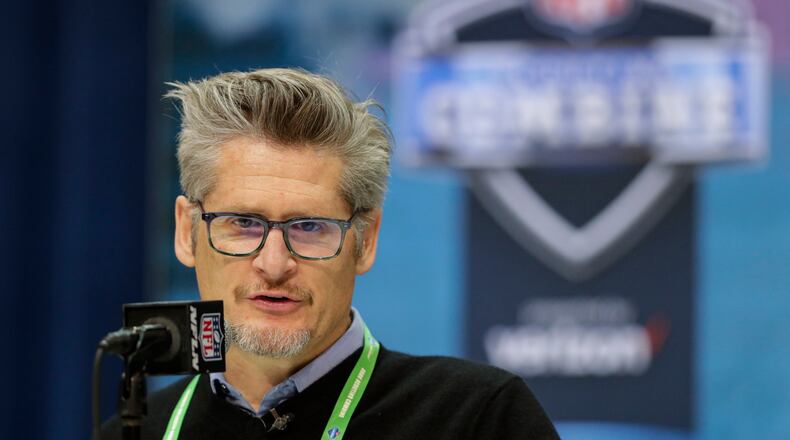The one extra 2020 playoff berth per conference included in the new NFL labor agreement may not help the Falcons. It wouldn't have been enough in 2018 or 2019. The new deal does help Falcons general manager Thomas Dimitroff mitigate the damage from mistakes that busted his team's salary cap.
Now we'll see if Dimitroff can make good on his pledge to add enough player talent to make the Falcons contenders. The GM got a needed bail out when a slim majority of NFL players voted to accept the negotiated labor deal. The Falcons started shedding salaries the next day.
Two Falcons starters are out: cornerback Desmond Trufant and running back Devonta Freeman. Two backups are gone: tight end Luke Stocker and tackle Ty Sambrailo. The Falcons now have enough cap space to sign the players they'll draft next month with a few million dollars of room left over. They had to subtract players before they could start adding. They added by trading for Ravens veteran tight end Hayden Hurst after Austin Hooper will sign with the Browns.
Releasing Freeman and Sambrailo was a relatively easy call under the circumstances. Freeman has been to the Pro Bowl twice but he’s a declining player at a position that’s lost value. The Falcons once hoped Sambrailo could start but he’s a backup. Stocker wasn’t an essential piece.
Trufant is a much tougher cut. His (injury-related) decline puts Trufant in the bottom-tier among the league’s No. 1 cornerbacks. He was the best Falcons cornerback when healthy. But a large gap had formed between Trufant’s production and salary.
The Falcons needed the cap space. The league-wide increase for 2020 is modest: $10 million per team to $198.2 million. That’s roughly $2 million less than projected. It represents the smallest increase by percentage since the 2013 season.
But teams can use two rules to create space. They can spread the salary-cap hits for released players over two seasons, and raise or lower base salaries by more than 30%. Those provisions make it simpler to lower cap figures by releasing high-paid players or restructuring contracts. They weren’t available without a new labor deal
Using those rules can mean delaying salary-cap pain now for bigger headaches later. It should sting less next season because of an expected big spike in the salary cap limit. The Falcons, all-in for the playoffs in 2020, are willing to keep pushing cap hits forward.
I don’t see many more painless, space-saving cuts the Falcons can make. Defensive end Allen Bailey might qualify. He played about half the snaps in 2019 and helped the Falcons be OK against the run. Bailey provides less as a pass rusher, which is what the Falcons really need.
They could clear space by releasing center Alex Mack or safety Ricardo Allen. It’s not ideal. They are important starters at positions lacking depth. Those factors make Mack and Allen possible candidates for restructured contracts that reduce their 2020 cap figures.
Even before the new labor deal, Dimitroff argued that the Falcons are not in "salary cap hell" because they have key, core players under contract. That's a fair point. It would be a better one if the Falcons hadn't missed the playoffs in consecutive seasons.
Matt Ryan, Julio Jones, Grady Jarrett and Deion Jones are good-to-great players with salaries that eat a big chunk of the team’s space. That’s not a good scenario for a losing team. The Falcons have a bad stars-to-wins ratio.
The Falcons are set at three important positions: quarterback (Ryan), left tackle (Jake Matthews) and defensive tackle (Jarrett). They are lacking at two other important positions: edge pass rusher and, even before Trufant's release, No. 1 cornerback. No NFL team can have it all, but the better ones have good players at those spots.
Teams pay big for them on the free-agent market and in the draft. The Falcons will be outbid for the best free-agent pass rushers and cornerbacks. Their highest draft pick is No. 16, so they’ll need some luck to draft a player at those positions who will be good right away.
The salary-cap increase wasn’t ever going to be enough to provide much relief for the Falcons. They still could have used that extra $2 million that was projected. Past miscalculations left their cap in bad shape for a non-playoff team.
They punted on their top free agent, Hooper. ESPN reports that the Browns are set to make Hooper the league's highest-paid tight end. He's good but that would be an overpay, which happens in free agency. The Falcons shouldn't re-sign Hooper if it means releasing a core player and leaving less cap space for higher priorities.
The Falcons aren’t likely to be in the running for the best pass rushers and cornerbacks on the market. They need smart signings of undervalued players, or the the opposite of last year. They added free-agent guards Jamon Brown and James Carpenter and the offensive line got worse.
The new labor agreement allows Dimitroff to alleviate some of the cap damage from those mistakes and others. Now comes the harder part: making the roster better with limited resources. Real improvement for the Falcons will require Dimitroff and Dan Quinn to get more than expected from the players they acquire and coach.
About the Author
The Latest
Featured


